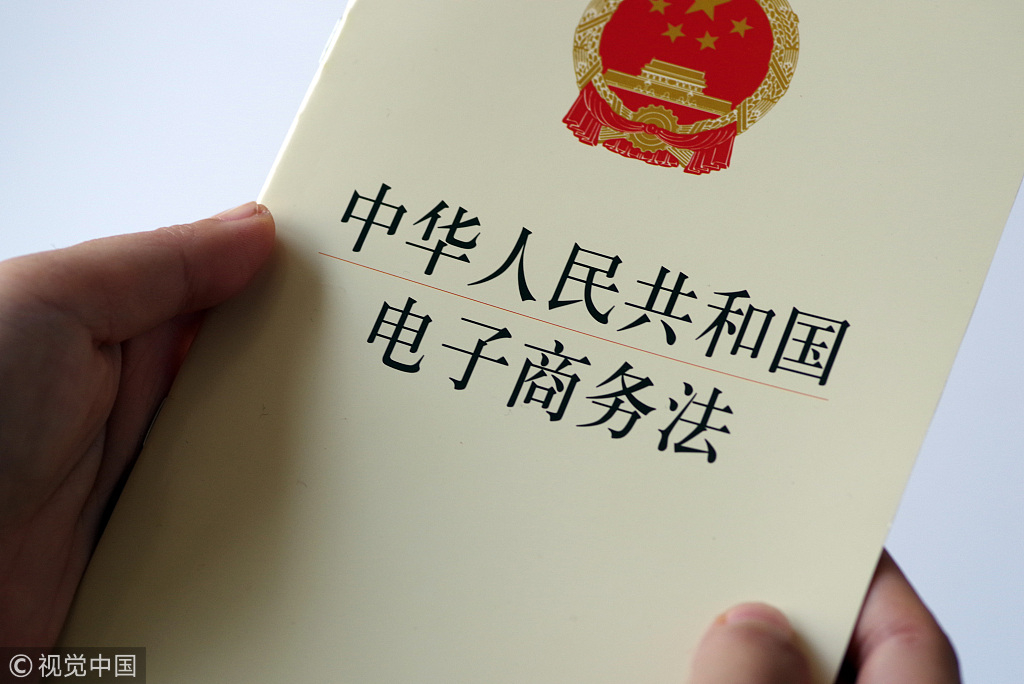
Opinion
18:09, 09-Mar-2019
China's E-Commerce Law boosts innovation and consumer-driven economy
Andy Mok

Editor's note: Andy Mok is a non-resident fellow at the Center for China and Globalization (CCG). The article reflects the author's opinion, and not necessarily the views of CGTN.
Chinese Premier Li Keqiang in this year‘s Government Work Report proposed to comprehensively promote "Internet Plus" and transform the tradition with new technologies and new models. The e-commerce industry extended from the traditional retail industry can be said to be a typical example of a “traditional industry” that is being transformed.
The E-Commerce Law, which was adopted on Aug. 31, 2018, and came into effect on Jan. 1, 2019, demonstrates that the development of the e-commerce industry has entered a new era with special laws.
Why is a new commence law necessary and what exactly are its key features? And how does the law affect the development of e-commerce not just in China but beyond its shores?

VCG Photo.
VCG Photo.
China's domestic e-commerce market is not only enormous but experiencing sustained explosive growth. In 2015, it had already reached 630 billion U.S. dollars making it 80 percent bigger than that of America's. It is also broad and becoming a mainstay for many consumers.
Initially, e-commerce focused on a few first-mover product categories such as apparel, and its customers were mostly in first-tier cities like Beijing and Shanghai. However, today e-commerce covers everything from major home appliances to food delivery to travel and personal services. Its geographical reach has also grown and now reaches almost all the cities above the county level in China.
According to a McKinsey report, e-commerce accounts for about 14 percent of all retail sales in China, one of the highest proportions of all major economies.
Moreover, alternative e-commerce-based distribution channels have gained popularity including a C2C (consumer to consumer) method known as daigou (代购) in Chinese whereby a Chinese individual overseas purchases and ships products from their location to customers in China to take advantage of lower prices overseas.

A copy of China's E-Commerce Law. /VCG Photo.
A copy of China's E-Commerce Law. /VCG Photo.
Finally, Chinese products have always been cost-competitive but in recent years have also become known for their appealing design and innovative features. As such, cross-border e-commerce has also grown tremendously with countries such as Russia becoming the biggest destination for products sold from China via e-commerce.
These developments have brought much greater convenience to consumers and made available to them a tantalizing new world of products and services. But e-commerce has also brought problems to consumers such as poor quality products, deceptive advertising and counterfeit goods. Fake goods also present problems to the producers of the goods being counterfeited.
In addition to losing revenue, counterfeits, typically of lower quality than the original, also damage the brand value and reputation of the owners of the genuine products.
In response to these developments, the government devised the E-Commerce Law.

VCG Photo.
VCG Photo.
Previously, e-commerce websites and apps such as Taobao, JD.com and Pinduoduo could avoid responsibility and liability for consumer product complaints, because they could claim they are only providing an independent marketplace for merchants actually selling products subject to complaints.
However, the new law imposes joint and several liability on all parties involved in an e-commerce transaction. This means that any participant in the transaction can be held fully and solely responsible for all of the damages caused by that transaction.
This matters because in many cases the merchant who sells the product is “judgment proof” (meaning that they do not have sufficient assets to satisfy a court judgment so that even if a consumer wins in court he or she may receive nothing as compensation). Also, merchants may just disappear only to reappear on an e-commerce website under a different name.
However, under the doctrine of joint and several liability, the e-commerce platform can be held fully responsible for damages caused by the merchant. Because these platforms are so big and visible, they are not judgment-proof and cannot run away.
Moreover, the new law also presumes that e-commerce platforms have knowledge of any problems with products sold by merchants on their platforms. This is known as constructive knowledge and ascribes knowledge of the matter in question whether or not the subject actually has this knowledge.
These two features of the law create a powerful incentive for e-commerce platforms to effectively police merchants on their platforms. As such, it seems likely problems such as falsely advertised products and counterfeits will be significantly reduced.
The law also requires registration of all e-commerce business and affects payments and other adjacent activities. However, the biggest impact will likely be on product quality and authenticity. This will benefit not only China's consumers but consumers all around the world who are increasingly counting on Chinese e-commerce to bring convenience and choice to their lives.
By strengthening confidence in China's e-commerce ecosystem, this new law will also contribute to the development of innovation and a consumer-driven Chinese economy.
(If you want to contribute and have specific expertise, please contact us at opinions@cgtn.com)

SITEMAP
Copyright © 2018 CGTN. Beijing ICP prepared NO.16065310-3
Copyright © 2018 CGTN. Beijing ICP prepared NO.16065310-3